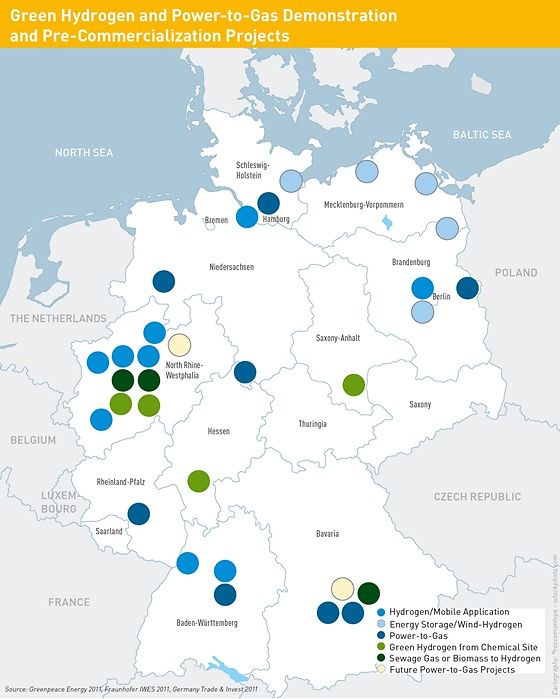Model Commercialization Projects in Germany
Center for Solar Energy and Hydrogen Research Baden-Wuerttemberg (ZSW), SolarFuel GmbH and Fraunhofer Institute for Wind Energy (IWES)
The Center for Solar Energy and Hydrogen Research Baden-Wuerttemberg (ZSW), in partnership with SolarFuel GmBH and the Fraunhofer Institute for Wind Energy and Energy System Technology (IWES) has been operating a 25 kilowatt power-to-gas pilot plant since 2009 (a second research facility, with 250 KW of electric power, is scheduled for completion by the end of 2012).
The demonstration facility produces standard certified substitute natural gas. The consortium received the German gas industry’s innovation and climate protection prize in 2010 for its pioneering power-to-gas work. SolarFuel GmBH and IWES are ZSW cooperation partners, with IWES overseeing grid connection and control while ZSW is responsible for process development and SolarFuel enjoying commercialization responsibilities.
Greenpeace Energy
Greenpeace Energy will be the first German energy supplier to provide its customers with "green hydrogen" energy created in regenerative and climate-neutral fashion from wind power. The wind energy provider operates a pilot electrolysis plant in Brandenburg. The "proWind gas" generated can be used for conventional domestic heating and cooking purposes and even as a fuel for vehicles.
Customers connected to the ordinary gas network have been able to take advantage of the "proWindgas" tariff since October 2011. A 0.4 eurocent proWindgas premium is reinvested in further developing the wind-gas technology. The Hamburg-based concern plans to build its own electrolysis plant in order to gradually increase wind-gas energy production share. The company signed a delivery contract with European electricity-from-renewable sources specialist ENERTRAG in January 2012.
Audi - Balanced Mobility
Auto manufacturer Audi has joined forces with energy providers EWE and SolarFuel GmbH in a project which will see the construction of an industrial pilot facility for the production of renewable gas (renamed "e-gas" as part of Audi's "Balanced Mobility" goal to guarantee climate-neutral mobility) from renewable energy surpluses.
The project represents a major step towards the commercialization of the power-to-gas technology. Located in Werlte near Oldenburg, the world's first large scale "e-gas" facility will be operational from the third quarter of 2013. Around four thousand cubic meters of renewable methane in natural gas quality will be produced daily for a connected load of 6.3 megawatts, fueling 1,500 turbo-compressed natural gas ("TCNG") Audi A3 vehicles for a year. Audi will begin serial production of the TCNG vehicle model range in 2013.
ENERTRAG
ENERTRAG is a European sustainable energy supplier that specializes in generating electricity solely from renewable sources (predominantly wind energy). The company’s "hybrid power station" - which transforms wind energy into hydrogen - is the first of its kind in the world.
Wind power generated in Prenzlau (Brandenburg) is helping heat and power homes as well as finding its way to gas pumps to fuel CO2-free mobility in Berlin. The company has already successfully deployed its energy storage solution at the world's first CO2-neutral filling station, and at the new Berlin International Airport scheduled to open in summer 2012. Project partners to date include the Brandenburg University of Technology Cottbus, Vattenfall, TOTAL Deutschland and the Deutsche Bahn.
CO2RRECT
Bayer, RWE and Siemens have joined forces with a number of academic partners to research ways of transforming climate-damaging CO2 into useful base chemicals using renewable energy sources. The focal point of the CO2RRECT (CO2-Reaction using Regenerative Energies and Catalytic Technologies) project is the long-term use of fluctuating energy from renewable sources for CO2 conversion.
The initiative bundles collective academic and industry know-how to identify ways of deploying surplus energy reserves for chemical production. As well as this, innovative technologies which allow the recovery of quantities of energy for the material use of CO2 as a carbon building block for chemical by-products (carbon monoxide and formic acid) are being researched. The project represents a new model of interaction between the energy and chemical sectors.
